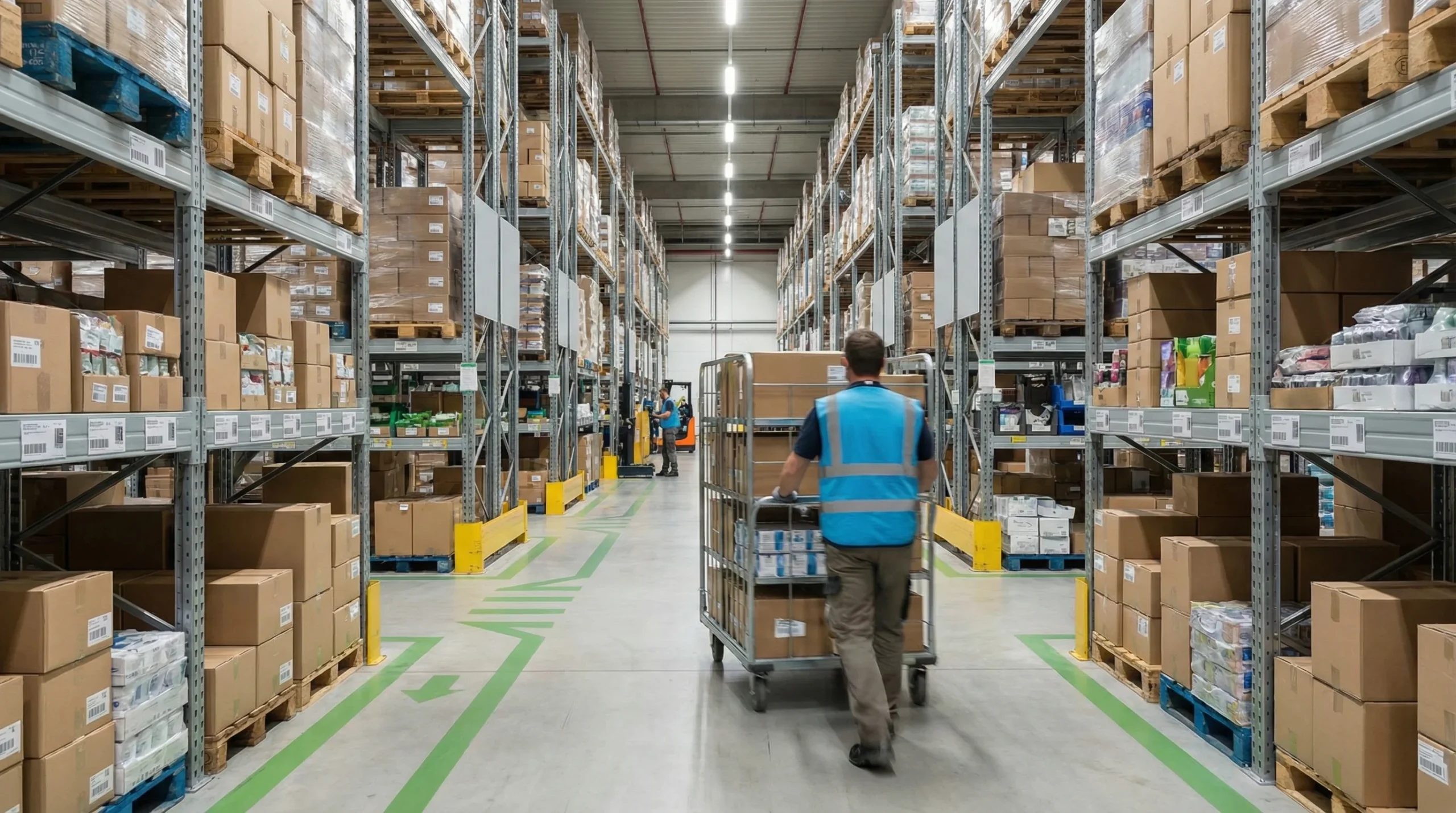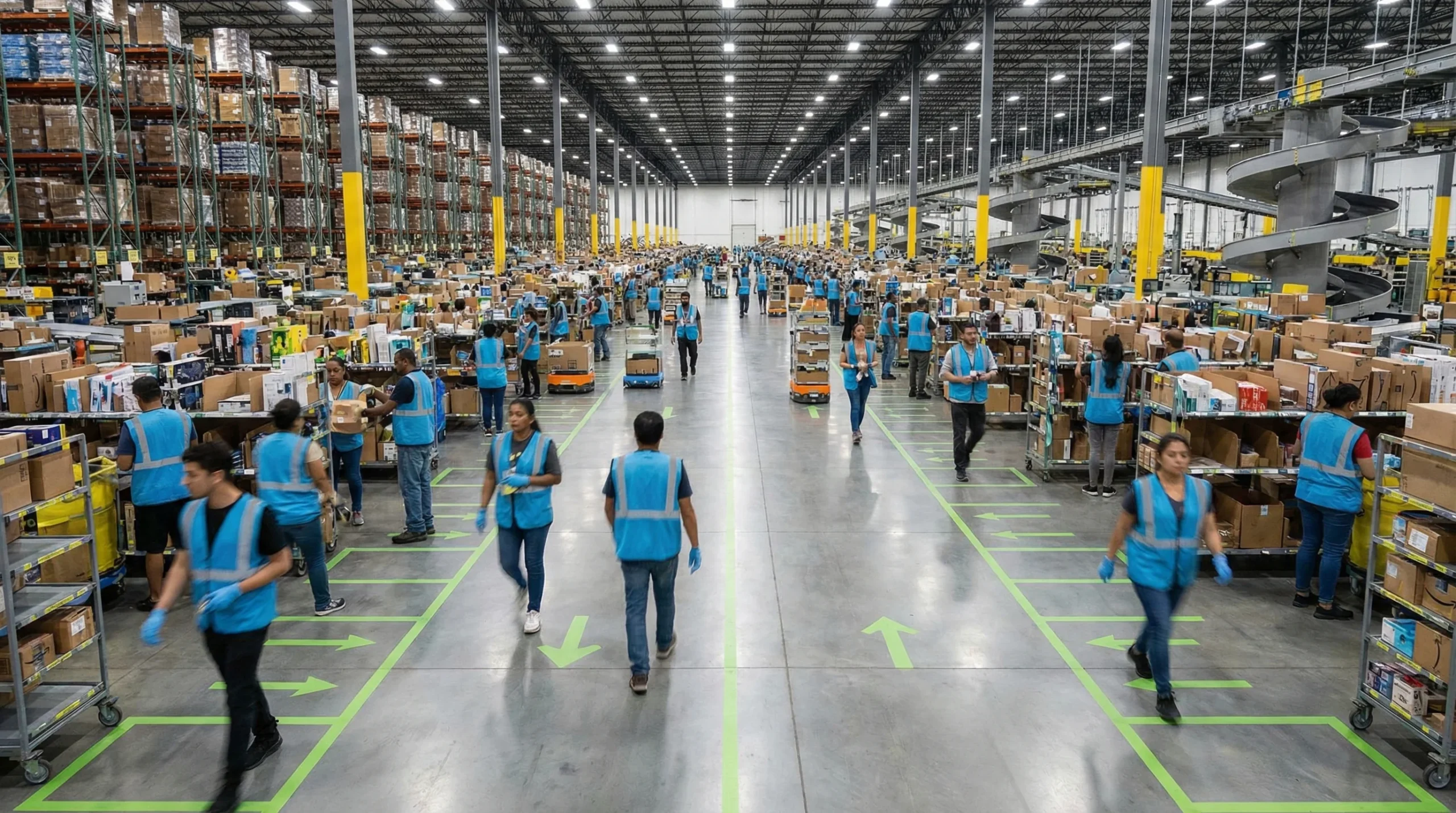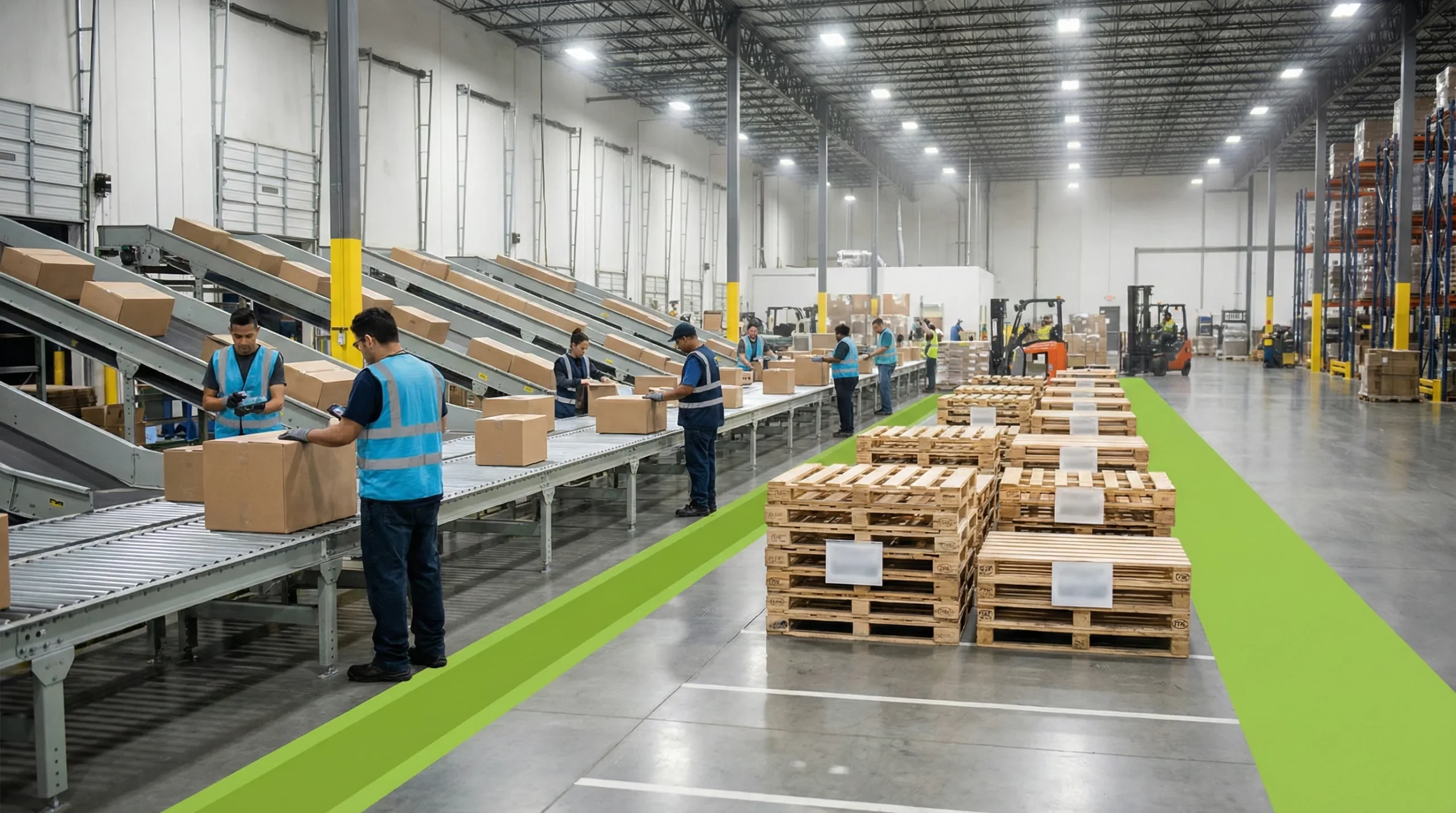In the rapidly evolving e-commerce landscape, Fulfillment by Amazon (FBA) has become a game-changer in the logistics sector. This innovative service enables sellers to leverage Amazon’s vast fulfillment network, entrusting the retail giant with the storage, packaging, shipping, and customer service aspects of their operations.
To remain competitive and seize the opportunities FBA offers, warehouse operators, managers, third-party logistics (3PL) providers, and distributors need to develop a thorough understanding of the FBA ecosystem and its implications for their business and clients. This guide delves into the intricacies of FBA, providing warehouse industry professionals with the insights necessary to navigate the complex world of FBA and make well-informed decisions that benefit their organizations and customers.
Introduction to Fulfillment by Amazon (FBA)
How Does FBA Work?
In this section, we will introduce the fundamentals of Fulfillment by Amazon and examine its key components, including shipping products to Amazon Fulfillment Centers, managing customer orders, and handling returns. Gaining a solid grasp of the FBA process is essential for warehouse operators and logistics providers who want to fully leverage this service to benefit their clients and enhance their business operations.
Smarter Warehouse Management Starts Here
From receiving to shipping, SphereWMS gives you real-time visibility and control over every square foot. See how it works for your operation.
Schedule Your DemoShipping Products to Amazon Fulfillment Centers
Amazon FBA sellers initiate the process by creating a shipping plan in their Amazon Seller Account, detailing the products and quantities they intend to ship to Amazon fulfillment centers. This plan also includes important information such as product dimensions, weight, and preparation requirements. Once the products are received at the Amazon fulfillment center, Amazon stores them in their warehouses, organizing them for efficient order fulfillment when customer purchases occur.
Customer Orders Through Amazon Marketplace
When a customer places an order for an FBA product on the Amazon marketplace, Amazon’s advanced warehouse management system springs into action. The system locates the product within the fulfillment center, and Amazon staff or automated systems pick, pack, and ship the product on the seller’s behalf. This streamlined process allows sellers to dedicate more time and resources to other aspects of their business, such as sourcing high-quality products, expanding their private label products, or optimizing their marketing strategies.
Customer Service and Returns Management
As part of the FBA service, Amazon will provide customer service in the form of handling inquiries, refunds, and returns for FBA orders. This not only ensures a seamless experience for customers but also helps maintain a high standard of customer service for professional sellers, which is essential for retaining customers and building brand loyalty. By offloading these responsibilities to Amazon, sellers can concentrate on growing their businesses and developing strategies to attract even more customers and boost sales.
Benefits of FBA for Warehouse Operators, Managers, and 3PLs
Access to Prime Customers
FBA products are eligible for Amazon Prime, a subscription service that offers free two-day shipping and other benefits to its members. By having products in Amazon’s FBA program, warehouse operators, managers, and 3PLs can tap into the large and growing customer base of more than 200 million Amazon Prime members. This increased visibility and accessibility can significantly boost sales for their clients, as Prime customers tend to make more frequent purchases and have higher average order values.
Inventory Storage and Management
FBA simplifies inventory storage and management for sellers by allowing Amazon to handle warehousing and inventory tracking. For warehouse operators, managers, and 3PLs, this means reduced complexity and the opportunity to focus on optimizing storage space and operations for their clients. However, it’s important to be aware of Amazon’s monthly storage fees, which are based on the daily average volume of inventory stored. By monitoring these fees, warehouse professionals can help their clients make informed decisions about inventory management and their monthly storage fee costs.
Leverage FBA for Multi-Channel Fulfillment
Warehouse operators, managers, and 3PLs can further benefit from FBA by using Amazon’s fulfillment network to fulfill orders from other sales channels, such as their clients’ own websites or other marketplaces. This fulfillment service, known as Multi-Channel Fulfillment (MCF), offers a streamlined solution for managing inventory and shipping across multiple channels. By leveraging MCF, warehouse professionals can provide an efficient and cost-effective fulfillment solution for their clients, helping them to manage their e-commerce businesses more effectively and expand their market reach.
Understanding FBA Costs
For warehouse operators, managers, and 3PLs, it’s crucial to understand the various FBA fees and costs to help their clients make informed decisions about leveraging Amazon’s services. Amazon FBA costs money, and it’s important to know how to manage these costs effectively. In this section, we’ll delve into the different fees associated with FBA and provide insights into managing these costs effectively.
Storage Fees
1. Monthly Inventory Storage Fees
Amazon charges FBA sellers monthly inventory storage fees based on the space their products occupy and how much inventory is in Amazon’s warehouses. These fees are calculated based on the daily average volume of inventory stored and can vary depending on the time of year. For warehouse professionals, this means closely monitoring inventory levels and working with clients to optimize storage space, which may involve adjusting inventory quantities or implementing strategies to improve inventory turnover.
2. Long-Term Storage Fees
In addition to monthly fees, Amazon charges long-term storage fees for inventory that has been in its fulfillment centers for more than 365 days. To minimize these fees, sellers should closely monitor their inventory levels and adjust them as needed. Warehouse operators can help their clients by providing regular inventory reports, identifying slow-moving items, and suggesting strategies for addressing excess inventory, such as promotions or clearance sales.
Fulfillment Fees
1. Shipping Costs
Amazon charges FBA sellers shipping fees based on the size and weight of the products being shipped. To reduce shipping costs, sellers should optimize their product packaging and ensure that their products are within Amazon’s specified size and weight limits. Warehouse operators and managers can assist their clients by providing guidance on packaging best practices and helping them identify opportunities for reducing product dimensions or weight without compromising product quality.
2. Returns Processing Fee
For certain product categories, Amazon charges a returns processing fee when a customer returns an item. This fee covers the cost of return shipping, as well as any necessary repackaging or restocking of the returned item. To manage these fees effectively, warehouse operators and 3PLs should understand the specific return policies for each product category and work with their clients to minimize return rates by focusing on product quality, accurate product listings, and proactive customer service. Additionally, maintaining efficient returns processing procedures can help ensure that returned items are quickly and accurately reintegrated into inventory, minimizing the impact of returns on overall costs.

Inventory Management and Shipping
For warehouse operators and 3PL providers involved in Fulfillment by Amazon, effective inventory management and shipping practices are crucial to the success of each of their Amazon FBA seller clients’ businesses.
In this section, we’ll discuss inventory management best practices and shipping strategies for those supporting clients in the FBA process. By following these guidelines, you can help optimize inventory levels, reduce costs, and ensure a smooth shipping process for your clients’ products. Let’s dive into the key aspects of inventory management and shipping to help you navigate the FBA landscape with confidence.
Inventory Management Best Practices for FBA Sellers
Monitor Inventory Performance Index (IPI)
Amazon uses the Inventory Performance Index (IPI) to evaluate a seller’s inventory management. A higher IPI score indicates better inventory management, which can lead to lower fees and unlimited storage space for some sellers. Regularly monitoring and improving your IPI can help you optimize your inventory levels and reduce costs.
Avoid Excess Inventory and Long-Term Storage Fees
To minimize long-term storage fees, sellers should avoid storing excess inventory in Amazon’s fulfillment centers. Regularly reviewing inventory levels and adjusting them as needed can help prevent products from incurring additional fees.
Utilize Amazon Shipment ID Labels
Using Amazon Shipment ID labels can help streamline the shipping process and ensure accurate tracking of inventory as it moves through the supply chain. Properly labeling shipments can help prevent delays and unplanned service fees.
Creating Shipping Plans and Managing Amazon Shipments
Optimize Shipping Plans
Creating efficient shipping plans is crucial for managing Amazon shipments. By optimizing your shipping plans, you can minimize shipping costs and ensure that your inventory arrives at Amazon’s fulfillment centers on time and in good condition.
Track and Monitor Shipments
Tracking and monitoring your Amazon shipments is essential for staying informed about the status of your inventory. Regularly reviewing shipment data can help you identify potential issues and address them before they impact your customers or your bottom line.
How 3PLs and Logistics Providers Can Support eCommerce Clients with FBA
Third-party logistics (3PL) providers and warehouse operators play a crucial role in helping e-commerce clients make the most of Fulfillment by Amazon. By offering a range of FBA-related services, they can ensure a seamless fulfillment experience and help clients optimize their FBA operations.
- Inventory management: 3PLs and warehouse operators can assist their clients in managing their inventory by handling tasks such as receiving, storing, and tracking stock levels. They can also help clients make informed decisions about the optimal inventory levels to send to Amazon’s fulfillment centers.
- Preparing shipments: These service providers can help e-commerce clients create shipping plans, ensuring that products are correctly packaged and labeled according to Amazon’s requirements before being shipped to fulfillment centers.
- Integration with Amazon Seller Central: 3PLs and warehouse operators often integrate with their clients’ Amazon Seller Central accounts, enabling them to access and manage essential information, such as order details, shipping plans, and inventory levels, on behalf of their clients.
- Multi-channel fulfillment: In some cases, 3PLs and warehouse operators can help their clients fulfill orders from other sales channels, such as their own websites or other marketplaces, by leveraging Amazon’s fulfillment network through the Multi-Channel Fulfillment (MCF) service.
- Reporting and analytics: 3PLs and warehouse operators can provide their clients with regular reports and analytics on key performance indicators (KPIs) related to their FBA operations. This helps e-commerce clients make data-driven decisions to optimize their inventory management, shipping strategies, and overall FBA performance.
Seller Fulfilled Prime (SFP)
In addition to FBA, Seller Fulfilled Prime (SFP) is another fulfillment option that warehouse and logistics professionals can offer their e-commerce clients. SFP enables sellers to fulfill their Amazon Prime orders from their own warehouse or third-party warehouse, allowing them to leverage the benefits of Amazon Prime without having to use FBA.
To use SFP, sellers must meet Amazon’s strict requirements for shipping speed, on-time delivery, and order cancellation rates. Warehouse and logistics professionals can help their clients meet these requirements by offering services such as expedited shipping, order tracking, and inventory management.
Fulfillment by Merchant (FBM)
Fulfillment by Merchant (FBM) is another option for e-commerce sellers to fulfill their orders on Amazon. With FBM, sellers handle their own warehousing, order fulfillment, and shipping directly to customers.
For 3PLs and warehouse operators, FBM offers an opportunity to work with e-commerce clients who prefer to manage their own fulfillment but may still need assistance with various aspects of the process. These service providers can support their clients by offering services such as inventory management, order processing, and shipping assistance. By providing these services, 3PLs and warehouse operators can help their e-commerce clients streamline their FBM operations and ensure a seamless customer experience.
Whether their clients choose to use FBA, SFP, or FBM, 3PLs and warehouse operators can play a critical role in helping them optimize their fulfillment operations and maximize the benefits of selling on Amazon.
Choosing the Right Warehouse Management System (WMS) for FBA Operations
A suitable WMS can help warehouse operators and managers optimize their FBA operations by automating tasks such as receiving orders electronically, importing orders into the WMS, and sending shipping and invoice details via EDI to retailers. When selecting a WMS, warehouse professionals should consider factors such as:
- Integration capabilities: The chosen WMS should seamlessly integrate with Amazon Seller Central and other relevant e-commerce platforms, as well as any existing ERP or order management systems.
- Scalability: The WMS should be able to accommodate future growth, both in terms of inventory volume and complexity of operations.
- Customization: The WMS should offer the flexibility to tailor its features and functionalities to the specific needs of your FBA operations.
- Support and training: The WMS provider should offer comprehensive support and training to ensure a smooth implementation and ongoing success.
SphereWMS is designed to help warehouse operators and managers optimize their FBA operations by offering powerful tools and features, including EDI integration. Its retail-compliant EDI integration solution streamlines the order processing and fulfillment workflow, automating tasks such as receiving orders electronically, importing orders into SphereWMS, and sending shipping and invoice details via EDI to retailers. With pre-built integrations for over 1,600 trading partners, including Amazon Vendor Central, SphereWMS offers a robust and flexible solution tailored to the needs of Amazon sellers.
By choosing SphereWMS, warehouse professionals can eliminate manual processes, enhance productivity, and better serve their clients in the ever-evolving world of Amazon FBA.
Technology Integration for Amazon Warehouse Management Operations
Successful FBA operations require seamless technology integration between your existing systems and Amazon’s platform. Warehouse operators must establish robust data connections to maintain real-time visibility across inventory movements, shipping statuses, and performance metrics.
API Integration and Data Synchronization
Modern amazon warehouse system implementations rely heavily on Amazon’s Marketplace Web Service (MWS) and Selling Partner API to automate critical processes. These integrations enable automatic inventory updates, shipment creation, and performance monitoring without manual intervention. Key integration points include:
- Inventory feeds: Real-time synchronization between your WMS and Amazon’s inventory management system
- Shipment notifications: Automated alerts when products arrive at Amazon fulfillment centers
- Performance dashboards: Consolidated reporting that combines FBA metrics with internal warehouse KPIs
- Order routing: Intelligent decision-making for multi-channel fulfillment based on inventory location and customer delivery requirements
Warehouse operators utilizing an amazon wms system benefit from pre-built connectors that streamline these integrations. Advanced systems can automatically route orders between FBA and internal fulfillment based on predefined business rules, optimizing for cost, speed, or inventory availability.
Performance Monitoring and Analytics
Effective amazon warehouse management requires continuous monitoring of operational metrics that directly impact FBA success. Critical performance indicators include inventory turnover rates, storage utilization efficiency, and shipment accuracy scores. Leading warehouse operators implement dashboards that track:
- Inventory Performance Index (IPI) trends and forecasting
- Storage fee optimization opportunities
- Shipment defect rates and root cause analysis
- Cross-docking efficiency for FBA-bound inventory
Advanced FBA Strategies for Multi-Client 3PL Operations
Third-party logistics providers managing multiple e-commerce clients face unique challenges when implementing FBA strategies. Success requires sophisticated account segregation, inventory allocation, and performance optimization across diverse product portfolios and client requirements.
Client Account Management and Segregation
Professional 3PL operators must maintain strict separation between client inventories while maximizing operational efficiencies. This involves implementing warehouse management protocols that ensure accurate inventory attribution, separate billing structures, and client-specific performance reporting. Advanced amazon warehouse management systems support multi-tenant architectures that enable:
- Dedicated inventory zones with barcode validation
- Client-specific shipping plan creation and management
- Segregated performance analytics and cost allocation
- Customized labeling and packaging requirements
Hybrid Fulfillment Model Optimization
Many 3PL clients benefit from hybrid approaches that combine FBA with traditional fulfillment methods. For amazon sfp ecommerce fulfillment warehouse operations, this means developing sophisticated order routing logic that considers factors such as product velocity, seasonality, and geographic customer distribution. Successful implementations often include:
- SKU-level analysis: Determining optimal fulfillment methods based on historical sales data and margin requirements
- Seasonal inventory planning: Strategic pre-positioning of inventory between FBA centers and 3PL facilities
- Geographic optimization: Leveraging amazon sfp pick and pack warehouse capabilities for regional coverage gaps
- Cost modeling: Dynamic calculation of total fulfillment costs including storage, handling, and shipping fees
Advanced 3PL providers often maintain dedicated FBA preparation areas within their facilities, enabling rapid product inspection, labeling, and shipment creation for clients transitioning inventory into Amazon’s network. This approach reduces transit times and provides greater control over inventory quality before products reach Amazon fulfillment centers.
Conclusion
In conclusion, understanding the ins and outs of Fulfillment by Amazon (FBA) is crucial for warehouse operators, 3PLs, and distributors looking to better serve their e-commerce clients and stay competitive in the industry. By offering FBA fulfillment services, warehouse professionals can provide value-added services, improve their clients’ customer experience, and potentially attract new business opportunities.
Implementing a robust warehouse management system like SphereWMS can greatly enhance warehouse operations and streamline the FBA process. With its retail-compliant EDI integration and compatibility with Amazon Seller Central and other e-commerce platforms, SphereWMS offers a comprehensive solution tailored to the needs of warehouse operators and 3PLs.
By staying informed about FBA best practices, leveraging technology, and optimizing inventory management, warehouse professionals can better support their clients’ success on the Amazon marketplace and foster long-term partnerships. As e-commerce continues to grow, being well-equipped to manage FBA operations will be increasingly important for the success of warehouse operators, 3PL providers, and how they help every FBA business that they serve.
Frequently Asked Questions
What is Fulfillment by Amazon and how does it work?
Fulfillment by Amazon (FBA) is a service where sellers send inventory to Amazon fulfillment centers, and Amazon handles storage, picking, packing, shipping, and customer service. Products become Prime-eligible for fast shipping. Sellers pay storage fees and fulfillment fees per unit sold. FBA simplifies logistics but requires careful inventory planning to manage costs.
What are the advantages of using FBA for warehouse operators?
FBA provides access to Amazon’s world-class fulfillment network and Prime customer base without building your own infrastructure. It handles peak season capacity challenges and returns processing. Customer service operates 24/7 in multiple languages. Products gain the Prime badge, which significantly increases conversion rates and buy box eligibility on competitive listings.
How do FBA fees compare to self-fulfillment costs?
FBA fees include fulfillment fees based on product size and weight, plus monthly storage fees that increase during Q4 peak season. Compare total FBA costs against your warehouse labor, shipping rates, packaging materials, and overhead. Small, lightweight items with high turnover typically favor FBA, while large or slow-moving products often cost less with self-fulfillment.
What inventory management strategies work best with FBA?
Monitor your Inventory Performance Index (IPI) score to avoid storage limits and excess inventory fees. Use restock recommendations to maintain optimal inventory levels without overstocking. Remove or liquidate slow-moving inventory before long-term storage fees accumulate. Consider splitting inventory between FBA and your warehouse for flexibility during demand fluctuations.
Can warehouses use FBA alongside their own fulfillment operations?
Many successful sellers use hybrid fulfillment strategies, sending fast-moving products to FBA while fulfilling slower items or oversized products from their own warehouse. This approach optimizes costs while maintaining Prime eligibility for key products. WMS platforms can manage inventory allocation and route orders to the most cost-effective fulfillment option automatically.




